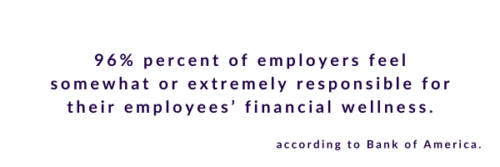Money Matters: The Unique ROI of Employee Financial Wellness. Financial wellness programs play a crucial role in building good habits and empowering employees. Here are three ways employers can see the ROI of these programs.
Ninety-six percent of employers feel somewhat or extremely responsible for their employees’ financial wellness, according to Bank of America’s 2023 Workplace Benefits Report. However, only 2 in 5 employers currently offer a financial wellness program.
Many more companies are interested in employee financial wellness. However, as with all investments, key stakeholders want to understand the return on investment (ROI) to justify the organizational cost.
Measuring the ROI of employee financial wellness programs requires a holistic approach. Employers often don’t realize the ripple effects that financial stress has on their employee’s day-to-day lives. Money issues impact workers of all generations and economic backgrounds and can affect everything from day-to-day productivity to the physical health of your team.
Learn more about the true ROI of offering a financial wellness program. Plus, gain insights into why companies increasingly offer financial wellness benefits to their teams.
The ROI of financial wellness programs: 3 advantages of offering a financial wellness program
1. Increased company efficiency and productivity.
No matter what stage of life your employees are in, money remains a top stressor for most Americans. Financial stress can affect employees’ wellbeing and productivity — in fact, 1 in 3 employees say that financial stress has distracted them at work and ultimately impacted their productivity, per PwC’s 2023 Employee Financial Wellness Survey.
For financially stressed employees, money worries take up a lot of headspace and energy — this can lead to employee dissatisfaction and overall lower productivity. According to PwC’s Employee Financial Wellness survey, 56% of financially stressed employees spend at least 3 hours per week at work worrying about their finances.
By offering a financial wellness program, companies can help decrease employees’ distractions and dial down their financial worries. And with a less distracted and financially stressed workforce, companies can benefit from increased company efficiency and productivity.
2. Lower healthcare costs.
ROI can be hard to measure, especially when it comes to the unexpected effects that company policies may have on employees. However, after looking at healthcare outcomes and costs, researchers at the Society for Human Resources (SHRM) have found there are several returns on investing in financial wellness programs, including improved employee health, lower absenteeism, and reduced turnover.
About 66% of organizations say that financial wellness benefits are “somewhat effective” or “very effective” in reducing their healthcare costs, according to SHRM’s research. To quantify this return on investment, researchers found that for every dollar invested in employee financial wellness has given companies a return on investment (ROI) of approximately $6 in reduced healthcare costs.
With a quality financial wellness program, employees can receive the tools and on-hand support they need to help dial down their financial stress. With less stress, employees can benefit from fewer healthcare visits and improved health outcomes, mentally, emotionally and physically.
3. Retain and attract top talent.
In today’s job market, a high salary isn’t enough to attract and keep top talent. As a result, HR leaders and C-suite executives see attracting and retaining top talent as a key business priority and area of investment. To remain a competitive employer of choice, many companies are increasingly investing in financial wellness programs.
Employees across the income ladder experience financial stress, and in today’s fluid job market, employees want an employer that values and supports their financial wellbeing. According to PwC’s Employee Financial Wellness survey, financially stressed employees are more likely to look for a new job and be attracted to an employer they feel cares more about their financial wellness.
For top talent, especially high-income earners, having access to financial wellness benefits can be a key deciding factor in choosing an employer. Instead of serving as an optional benefit offering, financial wellness support has increasingly become an expected core offering in the workplace.
Looking to maximize the ROI of your financial wellness program? Try Best Money Moves!
Best Money Moves is a mobile-first financial wellness solution designed to help dial down employees’ most top-of-mind financial stresses. As an easy-to-use financial well-being solution, Best Money Moves offers comprehensive support toward any money-related goal. With 1:1 money coaching, budgeting tools and other resources, our AI platform is designed to help improve employee financial well-being.
Whether it be retirement planning or securing a mortgage, Best Money Moves can guide employees through the most difficult financial times and topics. We have robust benefits options for employers, regardless of their benefits budget.
Our dedicated resources, partner offerings and 1000+ article library make Best Money Moves a leading benefit in bettering employee financial wellness.
To learn more about Best Money Moves Financial Wellness Platform, let’s schedule a call. Contact us and we’ll reach out to you soon.


